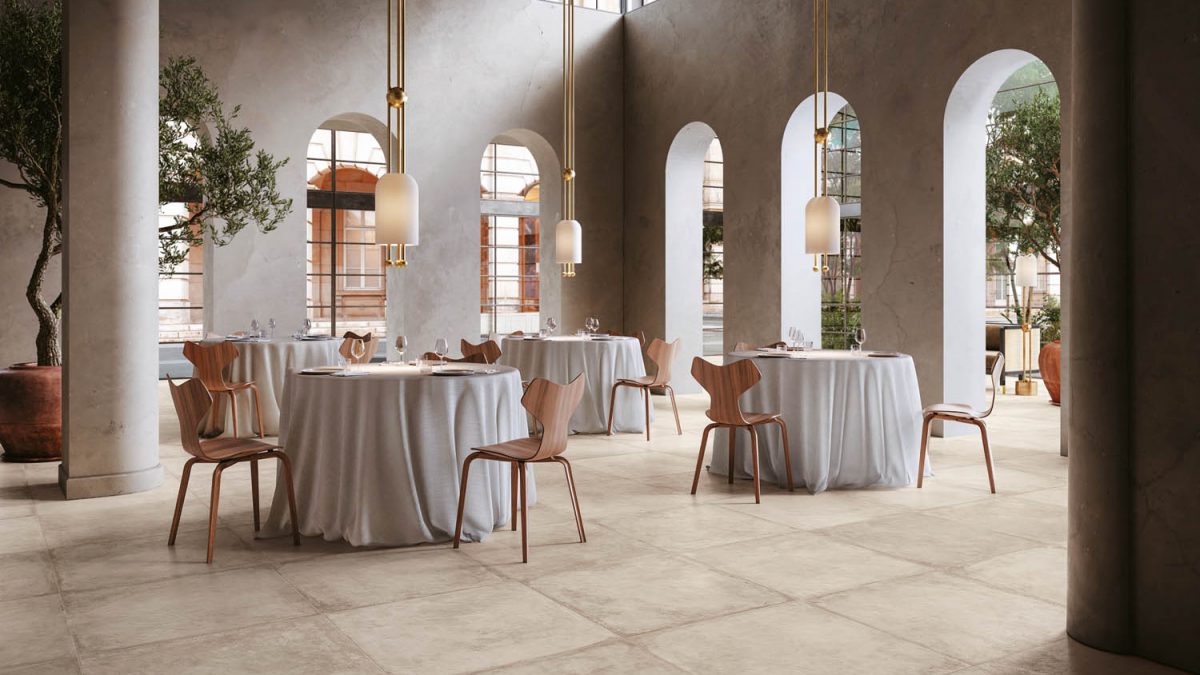
Restaurant tiling: what standards and how to choose the right one?
Creating a space that is both aesthetic and practical is essential for any public space, and it starts with choosing the right floor coverings. Restaurant tiling is governed by strict standards to ensure a safe, functional and clean environment. Not all tiles are equal, and for such a demanding place, the choice is all the more complex. Zoom in on the standards to be respected and the criteria for choosing restaurant tiles.
Laying tiles in a restaurant: what do the standards say?
Catering imposes strict requirements in terms of coverings. To meet these constraints, the choice of restaurant tiles must be oriented towards durable, safe and hygienic products.
EC regulation No. 852/2004 requires restaurants to have clean and well-maintained premises. The UPEC standard, for its part, assesses the resistance of tiles to wear, water and chemical agents.
The PEI standard specifically focuses on abrasion resistance and classifies tiles according to their destination. For restaurants that are public premises, the PEI V standard is required.
In addition, the choice of tiles must take into account slip resistance, with an R index between 10 and 13. The joints must also be waterproof, rot-proof and abrasion-resistant. As for the installation, it will respect a slope of 1.5 to 2% to prevent the risk of water stagnation.
In professional kitchens, additional standards apply. The tiles must be very resistant, easy to clean, waterproof and non-slip. The wall surfaces must be:
- Smooth;
- easy to clean;
- easy to disinfect.
Restaurant tile materials
The material of a restaurant tiles must absolutely be able to withstand the demands of a busy environment.
Porcelain stoneware
Porcelain stoneware is a benchmark choice due to its robustness and ease of maintenance. The full-body model is particularly suitable for areas with high traffic and high exposure to shocks. Moreover, it is available in a wide variety of finishes and colors that allow you to create a 100% personalized atmosphere. Glazed porcelain stoneware is also very popular for its aesthetic qualities and stain resistance. It is very easy to clean, and also offers a choice of the most varied finishes.
Ceramic
Another interesting solution for those looking for cheaper tiles: ceramic. Ceramic tiles stand out for their excellent value for money. Durable and easy to maintain, they are very often preferred by those looking for quality at a low price.
Natural stone paving
To bring a more authentic and durable side, nothing beats natural stone paving. Slate, marble, granite… There is something for all tastes and all budgets! However, this type of covering requires a floor capable of supporting a heavy weight and professional work.
What type of tiles for a restaurant kitchen?
Non-slip porcelain stoneware tiles are the little stars of professional kitchens. Some models perfectly imitate natural stone. This brings character and a warmer aspect to the decoration while retaining excellent technical properties.
Restaurant tiles: how to choose the right ones?
Choosing restaurant tiles is an important decision that affects the aesthetics and safety of the premises. Several criteria must be considered, starting with the use of the covering.
Wall or floor tiles?
The choice will not be the same if it is a wall or floor tile. The floor of a restaurant often undergoes heavy traffic, which requires a sufficiently resistant and non-slip covering. Although less stressed than the floor, the walls must still be covered with resistant tiles and above all, easy to clean.
Aesthetics
Beyond its practical side, the tiles of a restaurant create a unique atmosphere, hence the importance of choosing it well. The colors, patterns and finishes chosen are closely linked to the identity of the establishment and the customer experience. To gain brightness and give an impression of grandeur, plain tiles are preferred. Colored tiles bring a dynamic and more relaxed atmosphere. Those who wish to play on originality and uniqueness can opt for patterned tiles or imitations of other materials.
Maintenance
A restaurant is subject to significant hygiene constraints, which is why it must always remain impeccable. The choice of tiles will be made essentially on the ease of maintenance of the materials used and on their tolerance to cleaning products. Glazed porcelain stoneware is an excellent choice as it does not retain stains or odors. Other materials, such as earthenware or terracotta can also be considered. Also make sure to choose quality joints, waterproof and stain resistant to facilitate cleaning.
Laying and maintaining tiles: our advice
Once the tiles have been chosen, the installation and maintenance must follow precise steps to ensure their long-term durability. Laying tiles is a technical job that requires great precision and compliance with standards. Entrust this task to an experienced professional to obtain an impeccable installation.
Once the covering has been laid, remember to clean it regularly to keep it in perfect condition. The type of product suitable will depend on the material and the stains to be removed. Ideally, use neutral and non-aggressive products to avoid damaging the covering. After cleaning, rinse everything thoroughly with clean water to remove product residue, which could damage the tiles. Finally, remember to apply a water-repellent treatment to protect the covering from stubborn stains.
Conclusion
The choice of restaurant tiles should not be left to chance. The coverings of your floors and walls ensure the safety, hygiene and aesthetics of your establishment. Quality tiles must be: resistant, easy to maintain, aesthetic and safe. In addition to these criteria, the choice of tiles is also based on specific standards and regulations.




